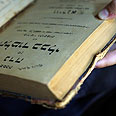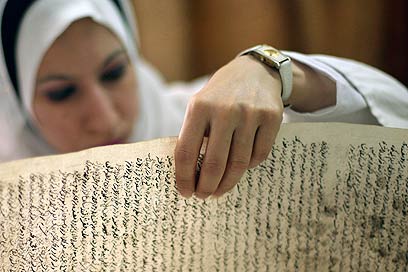
Iraq reclaims a Jewish history it once shunned
Jewish Archive of books, manuscripts, records and other materials has gone through turbulent times. Now Iraq wants it back
It was seized from Jewish families and wound up soaking in sewage water in the basement of a secret police building. Rescued from the chaos that engulfed Baghdad as Saddam Hussein was toppled, it now sits in safekeeping in an office near Washington, DC.
Like this country's once great Jewish community, the Iraqi Jewish Archive of books, manuscripts, records and other materials has gone through turbulent times. Now another twist may be in store: Iraq wants it back.
Iraqi officials say they will go to the US, possibly next month, to assess the materials found by US troops and plan for their return after an absence of nearly seven years.
Some Jewish authorities are skeptical, arguing that since most estimates put the number of Jews in Iraq at less than 10, the archive no longer belongs here. But to Saad Eskander, the director of the Iraq National Library and Archives, it is part of a larger effort to rescue the cultural history Iraq lost during the invasion, and to put Iraqis on a tentative path to coming to grips with their past.
"Iraqis must know that we are a diverse people, with different traditions, different religions, and we need to accept this diversity ... To show it to our people that Baghdad was always multiethnic," said Eskander.

Iraq National Library employee inspects damaged document found after US-led invasion (Photo: AP)
The archive was found in May 2003, when US troops looking for weapons of mass destruction got a tip to check out the basement of a building of the Mukhabarat – Saddam's secret police. Passing a 2,000-pound unexploded bomb on their way into the building, they found a flooded basement.
"It was really quite disgusting, to be honest, because it was about chest-deep sewage water," said Richard Gonzales, the Army officer who led the team and has since retired.
The troops found no WMD, but it was worth the trip. Books, photos and papers floated in the murky water. And not just any books, but Hebrew-language books, in a country that had been at war with Israel since 1948 and had once accused Jews of espionage and after a show trial hanged nine of them in a public square.
The fact that the materials survived at all is remarkable, considering how much of Iraq's cultural heritage was looted or destroyed after the fall of Saddam - more than a quarter of the National Library's books and 60% of its collection of maps, photographs and records, Eskander said.
Gonzales knew he had something significant on his hands but he didn't have enough people or tools to deal with it. So he went to Ahmed Chalabi, the leader of the Iraqi exile group whose discredited WMD claims had been the main justification for the invasion.
Chalabi got him a pump and some manpower. The materials were pulled out of the basement, laid out to dry in the sun and packed in 27 metal trunks.
Accumulated over the years were photos, parchments and cases to hold Torah scrolls; a Jewish religious book published in 1568; 50 copies of a children's primer in Hebrew and Arabic; books in Arabic and English, books printed in Baghdad, Warsaw and Venice – the lost heritage of what was once one of the largest Jewish communities in the Middle East, dating to the 6th century B.C.
Abraham of the Old Testament is believed to have come from the city of Ur, in what is modern-day Iraq, and despite periods of persecution, the community endured and thrived over centuries. But problems worsened when Iraq sided with Germany in World War II, and came to a head when Israel was created.
Pressure from US groups
By the early 1950s, Iraqi Jews were fleeing the country in droves. The few thousand who remained were harassed, too frightened to hold services, and their assets seized. In 1969, after Saddam's Baath party took power, came the hangings.
The secret police are believed to have confiscated countless books and other archival material from the Jewish community.
"Sometimes they would contact us when they had intelligence about such documents, Hebrew documents or books," said Kamil Jawad Ashour, the deputy director of the National Library. "On one occasion I went with them to a house in Basra of a Jewish family where they confiscated some documents and books from them. And there was only an old woman there."
After the 2003 invasion, Corine Wegener was working in Baghdad as an arts, monuments and archives officer - a rarity in the US military - when she was asked to examine the materials from the basement.
They were still damp, and that meant mold, a preservationist's nightmare.
Only freezing stops mold, so a refrigerator truck was found and kept running 24 hours a day.
"I was out there three or four times a day with a food thermometer checking the temperature," Wegener said.
Agreement was reached, and later approved by the Iraqi Ministry of Culture, to move the archive to the US for preservation.
After being freeze-dried in Texas, the collection was taken to the National Archives and Records Administration in College Park, Maryland. There the items were photographed, lightly cleaned, wrapped and boxed. NARA and the Center for Jewish History, a New York-based nonprofit group, are using the photos to catalog the collection. But to handle and digitize it, more preservation work would be needed.

Employee at Iraq National Library in Baghdad (Photo: AP)
The archive was supposed to return to Iraq after two years. Until now, the Iraqis - focused more on surviving the day to day violence in the country - have never pushed for the archive's return. Doris Hamburg, who directs preservation projects at NARA, said it takes ages to repair damaged materials. Further work needs outside funding that has not materialized.
But the archive's longer-than-anticipated stay in the US has raised questions in Iraq, where public opinion tends to conflate Israel with Jews in general, and anything even tangentially related to either is suspect.
"I am afraid that there is pressure from some groups, both inside and outside the United States, in order to prevent the return of these Iraqi manuscripts to their original country," said Abdullah Hamid, the head of Iraq's National Center for Manuscripts and Documents.
Hamburg denies any pressures and stresses Iraq can have the archive back whenever it wants, Iraqi officials at the National Library said they have no indication the Americans are trying to hold onto the archive.
But Dov S. Zakheim, an Orthodox Jew who was a senior Department of Defense official under President George W. Bush warned that if the Iraqis were to claim the archive as their own, it would anger the Jewish community.
"It's not theirs. It's just not theirs," he said. "Jews feel very strongly about their heritage."
Mordechai Ben-Porat, who helped orchestrate a mass airlift of Jews leaving Iraq after Israel's establishment in 1948, says the archive should be in the museum dedicated to Iraqi Jews which he runs in Israel, where Jewish scholars can make use of the materials.
"The books belong to the majority of the Iraqi Jews, and they are not in Iraq. The books should be given to us, as the representatives of the Jews of Iraq," he said.
However, he appeared resigned to the likelihood the archive would return to Iraq.
Maurice Shohet of the World Organization of Jews from Iraq said the community would like the materials to be digitized so that everyone has access, and was worried the necessary preservation work could not be done in Iraq.
"If these documents go back to Iraq the way they are they will be lost forever," he said.
'Politically sensitive'
Since Iraq has no diplomatic relations with Israel, Eskander thought it unlikely Israeli scholars would get visas to enter Iraq and study the archive. The Israeli Foreign Ministry said it was not involved in any move to bring the archive to Israel.
Digitization to make them available on the Web would solve a lot of the problems, but would require extensive preservation work, which many worry is beyond Iraq's present capabilities.
But Iraqi officials stressed they have the expertise and will make preservation a priority. Down the hall from Eskander's office are experts, many trained in Europe, who are repairing documents similarly damaged during the invasion.
Wegener said she was deeply torn about whether the collection should be removed from what at the time was an occupied country. But "I firmly believed then, and I believe now, that if we did not, it would have been destroyed."
All the same, the archive's long absence from Iraq has made it "politically sensitive," Eskander said. It "annoyed Iraqis a lot" that the Americans who failed to protect Iraqi cultural treasures were devoting such care to the Jewish archive.
Why, given its treatment of its Jewish population, would Iraq want the Jewish Archive back? Eskander, 48, can point to himself. He is a Faily, a member of a small Shiite-Kurdish minority persecuted under Saddam, and he wants Iraqis to know about such oppression and learn from it.
In a country that has lost thousands of lives to sectarian violence since 2003, where Christian churches are bombed, and where people perceived as friendly to Israel often receive death threats, Eskander can point to the collection of Hebrew-language books he has in his office for safekeeping.
Like the Iraqi Jewish Archive, these books were found tucked in the corner of another basement _ that one dry. They are catalogued on the library's Web site and available for study.
"The American national archive did a great job, and we're grateful for their help. ... The idea now is that we will do it here in Baghdad," Eskander said. "It's our cultural heritage."










